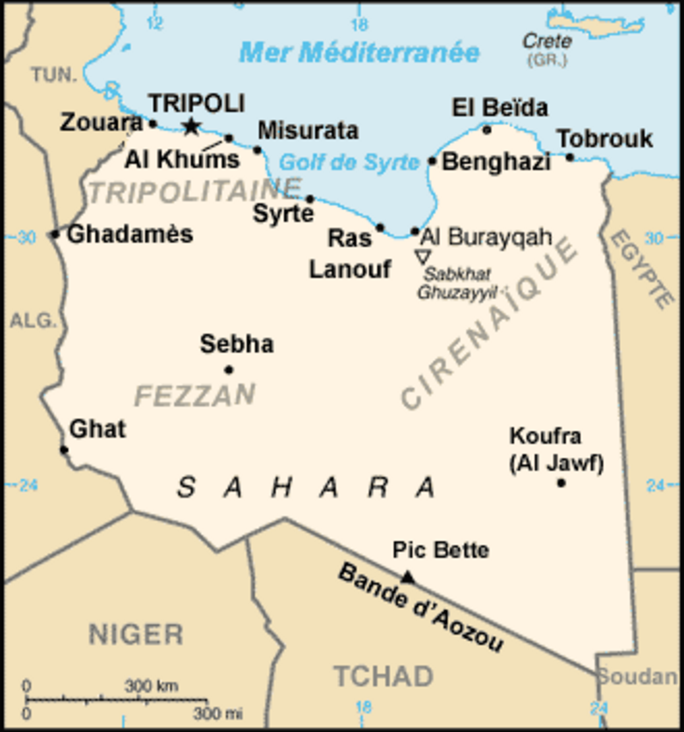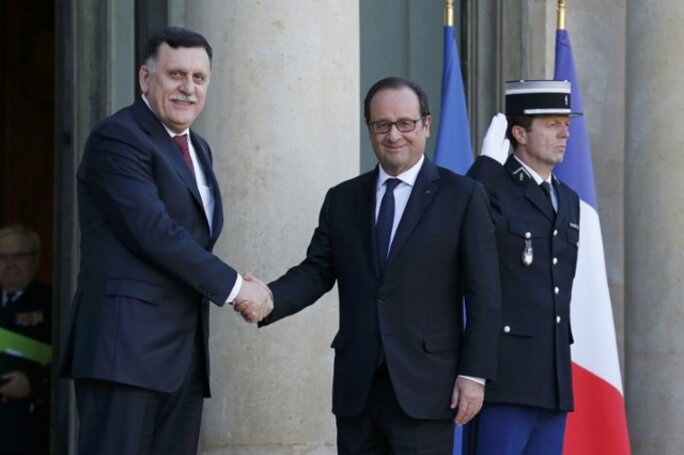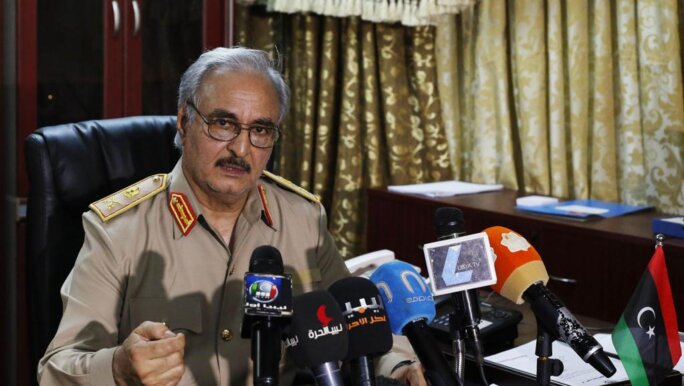One silence and two strategies. Nearly six years after Nicolas Sarkozy's military adventures in Libya, France under President François Hollande is conducting a policy towards the North African country that is often hard to decipher, shrouded in secrecy and shaped by a tug-of-war between the foreign and defence ministries.
Officially, France is no longer at war in Libya. But several French soldiers died there in July. Officially, too, Paris supports the Government of National Accord in Tripoli. But at the same time, using intelligence and military advisors, it is lending discreet support to General Khalifa Haftar in the east of the country, who opposes the Tripoli government from his stronghold in Benghazi.
The death of five French citizens last Monday, October 24th, in Malta, is a further illustration of France's complex approach towards Libya. Three of the men who died were confirmed as being from the Ministry of Defence and the aircraft, which belongs to the private firm CAE Aviation and which was often used by the French overseas intelligence service the DGSE and the military intelligence agency the DRM, was on a “reconnaissance mission in the Mediterranean”. According to several specialist websites (see here and here) the plane was due to fly over Libya, and in particular over Misrata, east of Tripoli.
Back in July France's Ministry of Defence confirmed the death of three French non-commissioned officers, all members of the DGSE, killed in a helicopter belonging to Haftar's forces which was apparently brought down by enemy fire in the Benghazi region. Yet when in February 2016 Le Monde revealed the presence of French soldiers, the Ministry of Defence quickly denied they were offering direct support in the eastern region of Cyrenaica which is controlled by Haftar. The ministry even announced an inquiry into how defence secrets had been “compromised”. However we are still awaiting the results of that investigation.
There is a good reason for that wait. For on July 20th the president of the Republic himself let the cat out of the bag when he declared: “We are currently conducting perilous intelligence operations. Three of our soldiers who were involved in these operations have just lost their lives in a helicopter accident.” The president's words were described as “very imprudent” even “irresponsible” in military circles. “One should never admit publicly that we're carrying out this kind of mission,” said one source. But the comments confirmed that, five years after the death of Muammar Gaddafi, France is indeed conducting a secret war in Libya.
Yet the French Parliament has never debated this, as the law does not oblige the government to discuss clandestine operations, just as it was never formally consulted over the start of the French intervention in 2011 in a country full of dark secrets (for example see Mediapart's story here on how the Sarkozy administration allowed a key Libyan figure to escape). A proposal for a committee of inquiry into the outcome of the intervention, put forward by the socialist vice-chairman of the National Assembly's defence committee, Nicolas Bays, went no further. British Members of Parliament were a little more curious however; the House of Commons foreign affairs select committee published a report on September 14th which delivered a damning verdict on those who started and oversaw the intervention, both in France and Britain.
Five-a-and-a-half years later the failure of the countries behind the military intervention is evident, based as it was on cover-ups, failures in analysis, ad hoc arrangements and dubious enthusiasm. They proved incapable of contributing to the political stability of the country. And despite the change of government in France in 2012 with the election of President Hollande, this country still seems to approach the complex puzzle that is the Libyan political scene with the same lack of circumspection.
In a country still fragmented by a mosaic of local militia, tribal forces and Islamist groups, with constantly shifting alliances and rivalries, there are two main rival power bases. The first is in Tripoli and is the Government of National Accord, born out of long negotiations between political groups under the aegis of the United Nations and following an agreement struck on December 17th, 2015, at Skhirat in Morocco. This government is led by prime minister Fayez al-Sarraj, an architect and businessman by profession, and is based in the old capital, Tripoli. Militarily its main support comes from the powerful militia based at Misrata, which contains both Islamists and anti-Gaddafi insurgents from 2011.
This government is the only one recognised by the international community, and also has important support from Turkey and Qatar. It is also helped, to a lesser degree, by Sudan. The government in Tripoli is also on good terms with its two neighbours to the west, Tunisia and Algeria, essentially so that they can jointly monitor their common borders, to detect arms trafficking and the movements of jihadists. But this government has not yet managed to impose its legitimacy and facing growing opposition. It suffered a new blow earlier this month when a group ousted by Sarraj seized official buildings in an attempted coup. This event was watched closely from Paris where there are fears about the current government's fragility.

The second centre of power is in the eastern region of Cyrenaica, home to the Parliament in Tobruk and strongman General Haftar. The general was once a senior military figure in the Gaddafi regime but was disgraced after the country suffered military defeat at the hands of neighbouring Chad, and he was later exiled to the United States. General Haftar returned to Libya after the overthrow of Gaddafi in 2011 and apparently wants to model himself on the new Egyptian strongman Abdel Fattah al-Sisi, whom he is said to admire. The general has blended former regular army soldiers and officers with militias hostile to Islamist groups in the Libyan National Army (LNA), which he considers to be the core of the new Libyan armed forces.
His influential supporters in the Tobruk Parliament refused to recognise the Fayez al-Sarraj administration, thus reducing its legitimacy. And thanks to generous aid from Egypt, Jordan and the United Arab Emirates who have sent him advisors and offered hundreds of tanks, helicopters and even a few old MiG aircraft decommissioned by the Egyptian air force, Haftar is today at the head of his country's leading military force. This has not yet enabled the general to retake control of all the towns in the east where jihadist groups have formed alliances with local militia. Nor has he himself been able to seize control of the major city of Sirte from Islamic State fighters, who are instead on the point of being defeated by the Misrata militia. But in September this year General Haftar's forces were able to gain control of the key oil terminals of Zueitina, Brega, Ras Lanuf and Sidra along the so-called Oil Crescent on the shores of the Gulf of Sirte.
'Libya is proof that French foreign policy is carried out by the defence ministry'
The existence of such confusion in a country that is vital for stability in the region and for the control of the flow of migrants is used as justification by Western countries, and France in particular, for their double game in Libya. Even if this double dealing itself leads to additional problems.
François Hollande's confirmation in July that France had a military presence alongside General Haftar immediately unleashed virulent protests from the Sarraj administration in Tripoli. The official Libyan government said it was outraged by this “unacceptable interference in the east of the country” and there were calls for a boycott of French companies and their products. At the same time the Shura Council of Benghazi Revolutionaries, which is fighting General Haftar's forces, called on Libyans to “mobilise and defend their religion ... and expel all foreign troops from Libya” against what it termed a “crusader invasion”.
It was to avoid aggravating this conflict with Tripoli that Paris supported – reluctantly according to someone close to events – the communiqué from Washington, London, Berlin, Rome and Madrid that condemned the conquest of Libya's 'oil crescent' by General Haftar's forces and called for troops occupying the area to “withdraw immediately, without preconditions”. And to further help heal the wounds with Tripoli, Fayez al-Sarraj was invited to Paris at the end of September where he was greeted by François Hollande, foreign minister Jean-Marc Ayrault and Jean-Yves Le Drian.

Enlargement : Illustration 4

At the start of October Ayrault again repeated France's diplomatic support for the Sarraj administration by organising a Paris gathering of regional countries and France's Western partners in the region, the United States, Britain, Germany, Italy and Spain. “We want Monsieur Sarraj's government of national accord to be a success,” Ayrault told TV5 television channel.
Meanwhile François Hollande himself declared: “The interest of the international community is to have a stable and secure Libya.” The French head of state then suggested the Libyan premier was going to pursue some initiatives. “We trust him to be able to expand his government and include all parties involved and I also hope that the Parliament will also have confidence in him,” said Hollande. He could hardly have made it clearer to the Libyan prime minister that France would look favourably on General Haftar joining the Tripoli government.
That is certainly the line being pursued by the Elysée which is trying to find a middle way between the French Foreign Ministry and the Defence Ministry, between whom relations are sometimes tense, as several sources have confirmed to Mediapart, speaking on condition of anonymity. “Even more than in Syria, Libya is proof that foreign policy is made in the Defence [Ministry] and not in the [Foreign Ministry],” sighs one young diplomat. “There are differences,” a Ministry of Defence official confirms. However, the official adds: “But that's nothing new and it's not specific to Libya. It's in fact rare that the two ministries agree spontaneously...”
No one denies these differences at the Elysée, where the president is in charge of arbitrating between the sides. But everyone there insists that the two approaches are in fact compatible. As far as François Hollande is concerned, while the Libyan Government of National Accord is legitimate it now has to be expanded. This is both because General Haftar has shown his military power and the fact that he is supported by Egypt, one of the key players in the region. The Elysée also accepts that given the confused nature of the situation in Libya it is not that strange if the French government's policy might seem so too. Nonetheless a French diplomat insists: “There's no other game other than an expanded government, approved by the Parliament in Tobruk. Otherwise it will be civil war.”
The diplomat's response is in fact a simple reflection of the balance of power on the ground in Libya. Paris, which is a permanent member of the United Nations Security Council, cannot do otherwise than support the government in Libya which has been anointed by the international community. That is the French Foreign Ministry's mission, to support the recognised government. As far as French diplomats are concerned, though weakened, Sarraj is the lowest but only common denominator capable of extricating the country from its political paralysis.
The Ministry of Defence, in charge of the war against Islamic State and jihadist terrorism beyond French borders, and which has the ear of President Hollande, has another point of view. It considers that the Tripoli government is in office but not in power and that the only strongman in the country, whatever his methods and secret ambitions, is General Haftar. In their view he is a key security ally in the fight against Islamic State and, looking forward, in the establishment of a strong and stable state in Libya.
'Haftar is the friend of France's friends'
So, in secret, Paris has decided to help Haftar establish control in the east of Libya, to plan and conduct his operations on the ground and to train his army. No matter if, along the way, Haftar's other friends, Egypt, the Arab Emirates and Jordan, regularly violate – as do Sarraj's allies – the Libyan weapons embargo in order to arm and equip their ally, as noted in a UN report in March 2016.
“France's aid to Haftar, in the form of advisors, was not interrupted after the death of the three French soldiers in Benghazi,” explains a diplomat familiar with events. “For one simple reason: he is the friend of France's friends, Egypt, the Emirates and Jordan, who regard him as a trump card in the region. He's helping Egypt to control their common border, to fight against incursions by jihadists and arms coming from Libya. He's thus an indispensable ally. All the region's leaders know that it is no coincidence that the main clandestine migration networks from Sub-Saharan Africa now pass through western Libya, through the borders of Tunisia and Algeria, and not through the east.”
In the view of his supporters, Haftar's government offers more guarantees than Sarraj's. And taking account of the current volume of migrants flowing towards Europe that is not an insignificant argument as far as Paris and other European capitals are concerned. Nor can French leaders ignore the fact that Libya, and in particular the stable anti-Islamic power base that Haftar represents, is attracting a lot of interest abroad. “If France let Haftar go then Moscow, which has still not got over the way that it felt short-changed in 2011 during the adoption of the resolution which authorised international intervention [in Libya], would rush to offer its support. Paris knows that. And Haftar too,” says the diplomat.

Enlargement : Illustration 5

Those who back France's support for General Haftar are convinced that Paris can continue to maintain two distinct policies in Libya. One diplomatic, the other military; the first official and open, the second secret. Are there signs that Jean-Marc Ayrault, who as foreign minister is in charge of the 'official' line, now thinks the two policies can converge? His recent comments picked up on President Hollande's remarks about Fayez al-Sarraj. “The prime minister should make new proposals to expand his government – in particular finding a place for General Haftar who has a presence to the east in military terms, so that all Libyan forces are united,” said Ayrault.
A broadening of the official Libyan government is not on the immediate agenda. But negotiations between Tripoli and Tobruk are not impossible. Some observers even suggest that Haftar's attack on the oil crescent was aimed at acquiring new bargaining chips ahead of fresh political haggling. So are French officials, who are aware of Sarraj's weakness and the fact that the people of Tripoli say he has done nothing to improve their daily lives, encouraging Haftar's plans in order to facilitate such a political initiative? Is it to appease the prime minister's irritation or to prepare the ground for the future that the French have decided to provide discreet military aid to both sides from now on?
Citing a source close to defence minister Jean-Yves Le Drian, journalists Christian Chesnot and Georges Malbrunot note in their latest book 'Nos très chers émirs' ('Our Very Dear Emirs'), published by Michel Lafon, that “some French special forces have been deployed on both sides of the belligerents, with General Haftar as well as with prime minister Sarraj”. But behind the security considerations, the fight against terrorism and concern over clandestine migration, some wonder whether France's double game in a run-down country that still managed to produce a million barrels of oil a day in 2017 might be motivated by other factors too.
-------------------------------------------------------------------------
- The French version of this article can be found here.
English version by Michael Streeter


